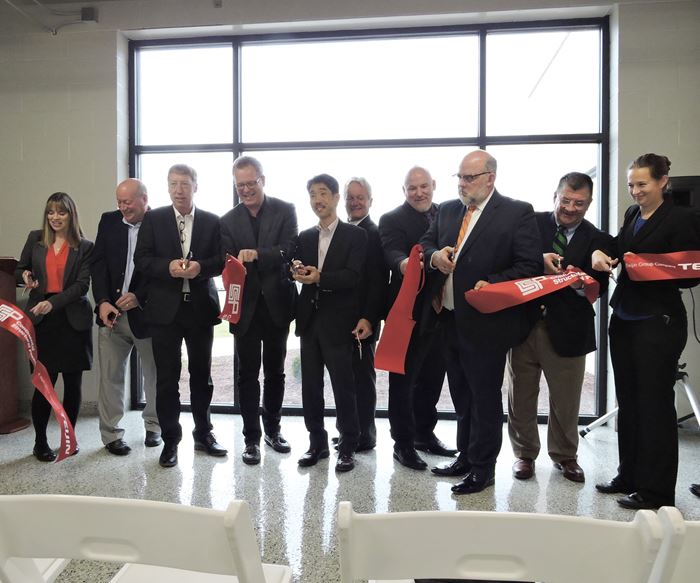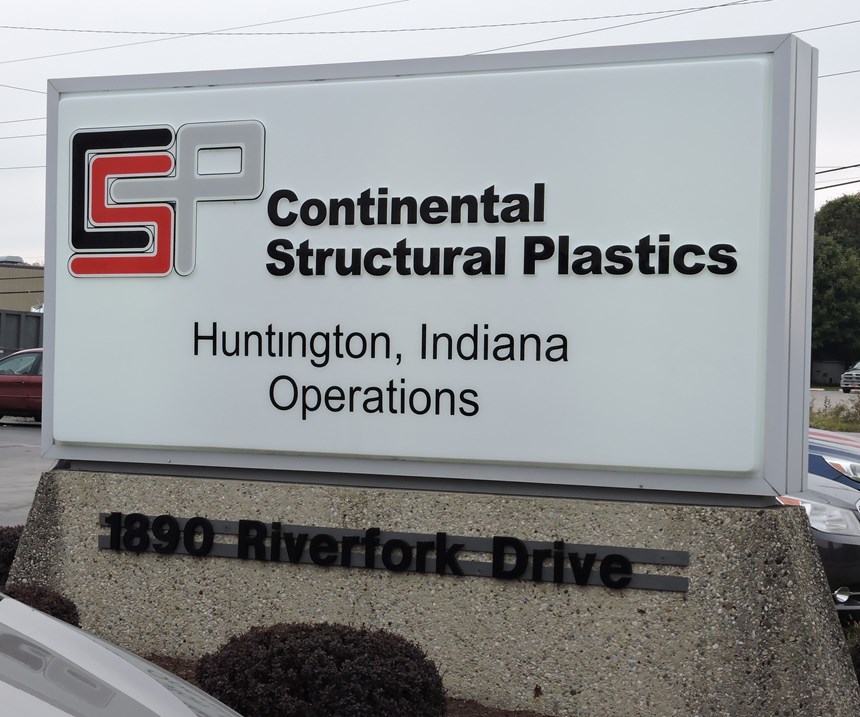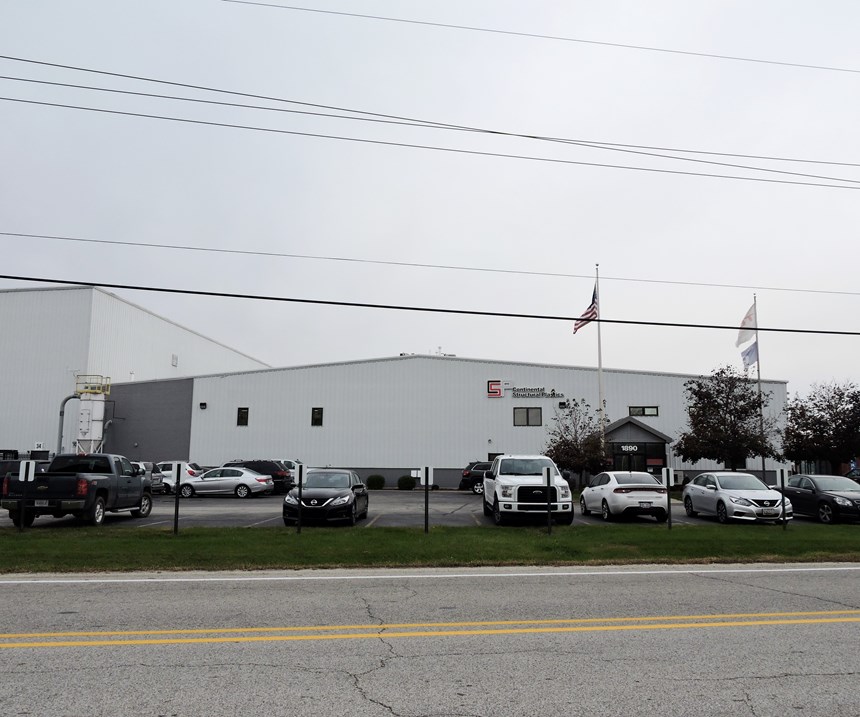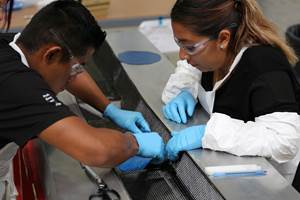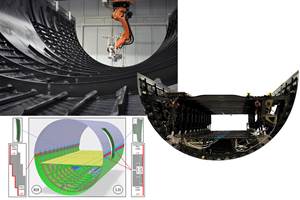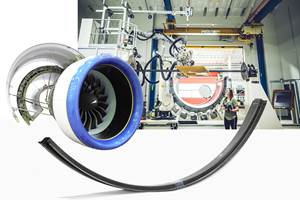Composite pickup box drives expansion of CSP’s Huntington, IN plant
The new expansion is where commercial production will begin next spring on the CarbonPro composite pickup box for top-of-the-line GMC Sierra Denali pickups.
On a cool Friday morning on Oct. 26, 52 people gathered in a meeting room at the Huntington, IN, US production facility of Tier 1 Continental Structural Plastics (CSP, Auburn Hills, MI, US, a Teijin Group company [Tokyo, Japan]). They were there to celebrate the opening of a new, US$33.5 million, 12,077 m2/130,000-ft2 addition to the already 19,510 m2/210,000-ft2 facility that CSP purchased in 2010 and where the company currently produces sheet-molding compound (SMC) composite parts for Chevrolet Corvette sports cars from General Motors Co. (GM, Detroit, MI, US) and Ford F-150 Raptor pickups from Ford Motor Co. (Dearborn, MI, US). The new expansion is where commercial production will begin next spring on the CarbonPro composite pickup box for top-of-the-line GMC Sierra Denali pickups. also from GM. CSP’s facility is located less than 30 minutes from GM’s Fort Wayne Assembly plant (Roanoke, IN, US) where the automaker produces Chevrolet Silverado and GMC Sierra single- and extended-cab pickup models.
The CarbonPro is not the first composite pickup box. Those accolades go to Ford’s short box on 2000 Explorer SportTrac crossover-utility vehicles (CUVs) made with compression-molded, fiberglass-reinforced vinyl ester SMC. Credit also goes to GM’s 2001 Chevrolet Silverado full-size pickup box in fiberglass-reinforced polyurethane/polyurea formed via structural reaction-injection molding (SRIM). GM, Honda Motor Co. Ltd. (Tokyo, Japan) and Toyota Motor Corp. (Tokyo, Japan) all have produced composite pickups boxes since. However, GM’s latest venture is the industry’s first composite box to use carbon fiber reinforcement and the first to use a thermoplastic matrix. That change alone reportedly chopped 28 kg off the vehicle vs. a bare steel bed and 45 kg vs. a steel bed plus bedliner — all while making the box dent-, scratch- and corrosion-resistant.
Several speakers mentioned the fact that CSP and materials supplier Teijin have worked jointly with GM since 2010 to develop the CarbonPro pickup box using Teijin’s then-recently-developed manufacturing process. This carbon fiber-reinforced thermoplastic (CFRTP) combines discontinuous/chopped carbon fiber (25 mm, 24K tow) with a polyamide 6 (PA6) matrix in sheet-form composites. (Reportedly, other thermoplastic matrices are under development but not yet commercially available.) Unlike conventional glass-mat thermoplastic (GMT) or organosheet composites, this material is not intended to be formed in a conventional compression press. Instead, it is press-molded much like stamping sheet metal in a very-rapid, sub-one-minute process — a cycle-time target that is the Holy Grail for automotive composite parts.
The advantage of using thermoplastic rather than thermoset matrices to produce a pickup box are many. Thermoplastics tend to be lower density, so they help reduce mass even more than thermoset composite boxes. Since thermoplastics are already fully polymerized, they process much faster than thermosets, which reduces the number of tools, robots and presses needed to produce parts for a given platform. And thermoplastics produce far better surfaces right out of the tool, which can greatly reduce post-mold finishing, including eliminating painting. Another benefit is that thermoplastics tend to be more impact-resistant — especially in tough matrices like PA6 — and that helps reduce damage to the bed when the pickups are in use.
By opting to reinforce the composite with carbon instead of glass fiber, a much thinner, lighter part can be produced for a given performance target, although carbon does increase cost unless offset by faster production processes.
The event featured speeches by 10 dignitaries including: Linda Walczak, director, Northeast Region, Indiana Economic Development Corp.; Larry Buzzard, president, Huntington County Board of Commissioners; Steve Rooney, CSP CEO; Dave Malik, GM director-Lower Body Structures; Masumi Hirata, assistant to Composites Business Unit Manager at Teijin Ltd.; Rob Miller, commissioner, Huntington County Board of Commissioners; Mark Voss, GM engineering group manager-advanced structural composites and pickup boxes; Brooks Fetters, mayor, City of Huntington; Mark Wickersham, executive director, Huntington County Economic Development; and Karen Williams, CSP Huntington plant manager. Following a ribbon cutting, attendees were offered a tour of the fully equipped section of the plant where the CarbonPro will be produced and then got a close-up view of the pickup box.
CSP also will be producing end-gate covers for the vehicle in direct-long-fiber thermoplastic (D-LFT) composite.
Related Content
Welding is not bonding
Discussion of the issues in our understanding of thermoplastic composite welded structures and certification of the latest materials and welding technologies for future airframes.
Read MoreComposites manufacturing for general aviation aircraft
General aviation, certified and experimental, has increasingly embraced composites over the decades, a path further driven by leveraged innovation in materials and processes and the evolving AAM market.
Read MoreManufacturing the MFFD thermoplastic composite fuselage
Demonstrator’s upper, lower shells and assembly prove materials and new processes for lighter, cheaper and more sustainable high-rate future aircraft.
Read MoreThe potential for thermoplastic composite nacelles
Collins Aerospace draws on global team, decades of experience to demonstrate large, curved AFP and welded structures for the next generation of aircraft.
Read MoreRead Next
Plant tour: Daher Shap’in TechCenter and composites production plant, Saint-Aignan-de-Grandlieu, France
Co-located R&D and production advance OOA thermosets, thermoplastics, welding, recycling and digital technologies for faster processing and certification of lighter, more sustainable composites.
Read MoreDeveloping bonded composite repair for ships, offshore units
Bureau Veritas and industry partners issue guidelines and pave the way for certification via StrengthBond Offshore project.
Read MoreVIDEO: High-volume processing for fiberglass components
Cannon Ergos, a company specializing in high-ton presses and equipment for composites fabrication and plastics processing, displayed automotive and industrial components at CAMX 2024.
Read More
.jpg;width=70;height=70;mode=crop)
